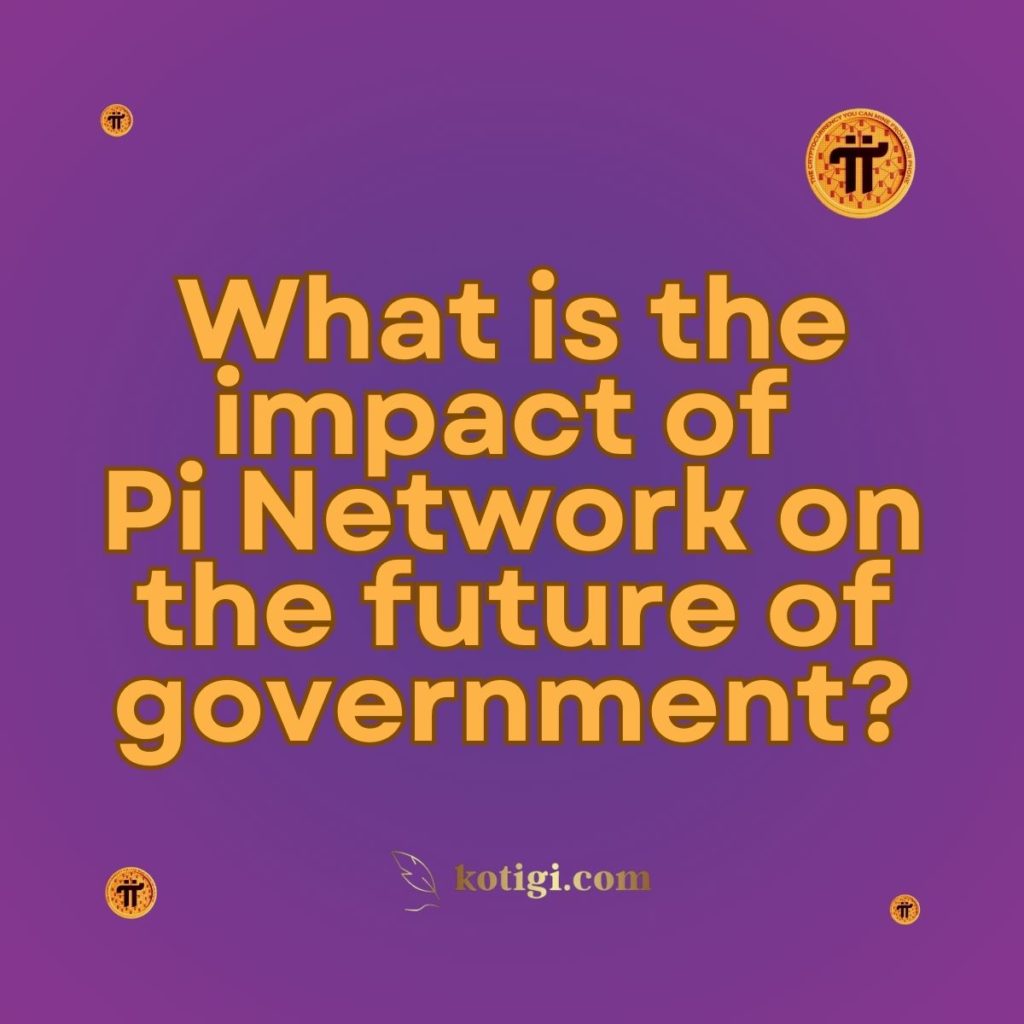
What is the impact of Pi Network on the future of government?
Pi Network’s decentralized blockchain technology has the potential to impact the future of government by improving transparency, reducing corruption, streamlining public services, and enhancing citizen engagement. This article explores how Pi Network could transform government functions, decision-making processes, and public trust.
Introduction
Governments around the world are facing growing pressure to be more transparent, efficient, and accountable. Emerging technologies, such as blockchain, offer new ways to address these challenges, and Pi Network, with its decentralized infrastructure, is positioned to play a significant role in this transformation. Pi Network can bring unprecedented transparency to governmental processes, reduce corruption, enhance public service delivery, and foster greater citizen participation in decision-making. This article examines the potential impact of Pi Network on the future of government and how blockchain technology could lead to more effective governance.
Enhancing Government Transparency
Blockchain technology, like that of Pi Network, provides a decentralized and immutable ledger that could significantly improve the transparency of government operations.
Public Ledger for Government Transactions
One of the core features of Pi Network is its ability to create a public, tamper-proof ledger. Governments could use this technology to record and publicly display financial transactions, budget allocations, and public expenditures. This increased visibility would allow citizens to track how public funds are being used, improving accountability and reducing opportunities for embezzlement or misuse of government resources.
Transparent Procurement Processes
Government procurement is often plagued by corruption and favoritism. Pi Network can introduce a transparent and fair procurement system where contracts, bids, and awards are recorded on the blockchain. This ensures that all transactions and bidding processes are visible and cannot be altered, ensuring that the most qualified bidders win contracts based on merit rather than influence or corruption.
Monitoring Public Projects
Pi Network could be used to monitor the progress and funding of public infrastructure projects. Blockchain records can provide real-time updates on project timelines, budgets, and milestones, enabling citizens to hold governments accountable for delays or overspending. This transparency fosters trust between the government and its constituents.
Reducing Corruption and Fraud in Government
Blockchain’s decentralized and immutable nature makes it a powerful tool for combating corruption and fraud, and Pi Network is well-suited for this purpose.
Immutable Records Prevent Fraud
Corruption often occurs when officials manipulate records or data. Pi Network’s blockchain can prevent such manipulations by creating immutable records of all transactions and decisions made by government entities. Once data is recorded on the blockchain, it cannot be changed or tampered with, making it harder for corrupt individuals to alter documents or falsify records.
Anti-Money Laundering and Financial Oversight
Governments can also leverage Pi Network to enforce anti-money laundering (AML) regulations. By tracking and recording financial transactions on a public ledger, governments can trace suspicious activities and ensure that financial regulations are being followed. This can greatly reduce financial crimes, including tax evasion and the laundering of illicit funds.
Elections and Voting Integrity
Corruption in elections undermines democratic processes. Pi Network could help secure the integrity of elections by using blockchain to record and verify votes. Each vote could be securely stored on the blockchain, preventing tampering and ensuring that elections are fair and transparent. With Pi Network’s decentralized platform, voters could cast their ballots from anywhere while having confidence that their votes are counted accurately.
Streamlining Public Service Delivery
Pi Network can help streamline public services by automating processes, reducing bureaucracy, and improving efficiency.
Digital Identity Verification
Many public services require identity verification, which can be time-consuming and prone to errors. Pi Network’s blockchain can enable decentralized digital identity systems where individuals securely store and control their personal information. Government agencies can verify identities through the blockchain without needing to store sensitive personal data themselves, reducing the risk of data breaches and speeding up service delivery.
Automating Welfare Distribution
Government welfare programs often involve complex, bureaucratic processes. With Pi Network, governments can automate welfare payments through smart contracts, ensuring that eligible citizens receive benefits directly and without delays. Smart contracts can trigger automatic payments once certain conditions are met, reducing administrative overhead and minimizing the potential for fraud.
Decentralizing Public Records
Public records, such as birth certificates, marriage licenses, and property deeds, could be stored securely on Pi Network’s blockchain. Citizens could access and manage these records without needing to visit government offices, reducing the time and effort required to obtain or update important documents. This decentralized system would also ensure that records are tamper-proof and easily accessible from anywhere.
Enhancing Citizen Participation and Engagement
Pi Network’s decentralized nature can foster greater citizen involvement in government decision-making and increase civic engagement.
Blockchain-Based Voting Systems
One of the most promising applications of Pi Network is in blockchain-based voting. By allowing citizens to vote securely and transparently on various issues, blockchain can increase voter participation and ensure that every vote is counted accurately. Governments could use Pi Network to conduct referendums, polls, or local elections, giving citizens a greater voice in decision-making processes.
Direct Democracy and Citizen-Led Proposals
With Pi Network, governments can experiment with forms of direct democracy, where citizens can propose and vote on laws or policies using blockchain-based platforms. Smart contracts could automatically execute the outcomes of these votes, giving citizens more direct influence over the policies that affect their lives. This decentralized approach to governance could strengthen democratic systems and promote a more engaged and informed electorate.
Enhancing Civic Transparency
Pi Network could also enable civic organizations to track and report on government activities more effectively. Citizens could use the blockchain to verify government claims, check public spending, and monitor the progress of policy implementation. This level of transparency would empower citizens to hold their governments accountable and push for more ethical governance.
Promoting Decentralized Governance Models
Blockchain technology, particularly through platforms like Pi Network, could enable new models of decentralized governance, reducing the concentration of power.
Autonomous Governance Platforms
Decentralized Autonomous Organizations (DAOs) can be built on Pi Network to manage certain aspects of governance without human intermediaries. These DAOs can operate through smart contracts, where predefined rules govern the decision-making process. This approach reduces the risk of corruption and bias, as decisions are made based on coded protocols rather than individual discretion.
Community-Based Governance
Pi Network’s decentralized nature could also support community-based governance models, where local communities have greater control over decision-making. For example, local governments could use Pi Network to allow residents to vote on budget allocations, public projects, or local policies, fostering more responsive and inclusive governance. These decentralized models empower citizens to take an active role in managing their communities.
Global Governance Solutions
Beyond local and national governance, Pi Network could contribute to global governance solutions by enabling cross-border cooperation. International organizations could use Pi Network to manage funding, track project progress, and ensure transparency in global initiatives. Blockchain could provide a common platform for governments to collaborate on issues such as climate change, public health, and humanitarian aid.
Conclusion
Pi Network has the potential to transform the future of government by promoting transparency, reducing corruption, streamlining public services, and enhancing citizen engagement. Its decentralized blockchain technology can create immutable records, support smart contracts for efficient service delivery, and empower citizens to participate more actively in governance. As governments explore ways to integrate emerging technologies, Pi Network could play a crucial role in building more accountable, transparent, and efficient governance systems that benefit citizens worldwide.
Key Takeaways
- Improving Transparency: Pi Network can enhance government transparency by providing a decentralized public ledger for transactions and procurement processes.
- Reducing Corruption: Blockchain’s immutable records can help prevent fraud and corruption by making government transactions and decisions tamper-proof.
- Streamlining Public Services: Pi Network can automate welfare distribution, digital identity verification, and public record management, making government services more efficient.
- Citizen Engagement: Blockchain-based voting and decentralized governance models on Pi Network can increase citizen participation and ensure more democratic decision-making processes.
- Decentralized Governance: Pi Network supports new models of decentralized governance, reducing centralized power and enabling community-led decision-making.





